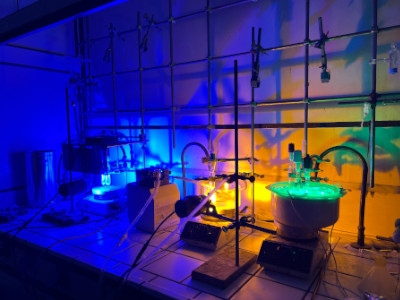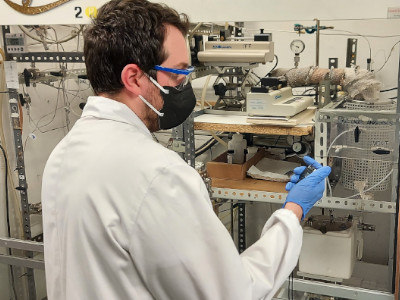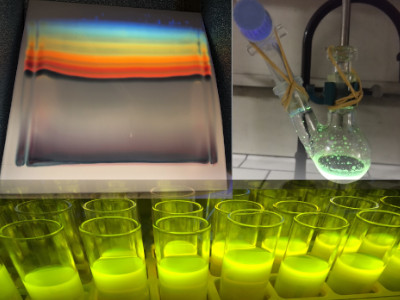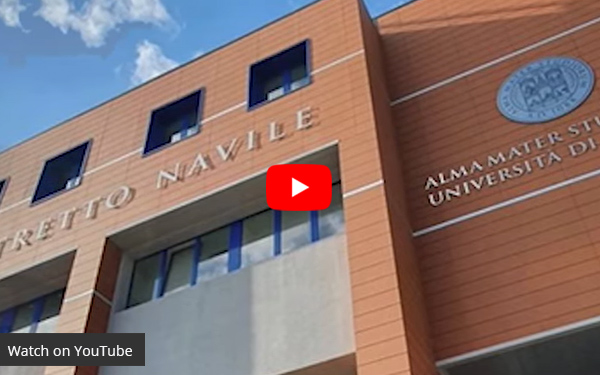 What is the Chemical Catalysis Research Centre (C3), when did it come into being and what are its goals?
What is the Chemical Catalysis Research Centre (C3), when did it come into being and what are its goals?
The Chemical Catalysis Centre - C3 was created at the joint initiative of researchers from the “Giacomo Ciamician” Chemistry and “Toso Montanari” Industrial Chemistry departments in late 2021. Its aim is to enhance different yet complementary competences in the fields of chemical catalysis, originating in a long tradition of scientific achievements, training of young researchers, and connections with the local and national chemical industry. The @UNIBO Catalysis Centre is unique on the Italian scientific scene, and boasts a virtually unparalleled critical mass, even internationally. “C3” has multiple missions ranging from competitive scientific research to training young research chemists ready to face current and future environmental sustainability challenges and the most modern aspects of the third mission. The latter field plays a major role within the Chemical Catalysis Centre, enhancing interactions between academia and the world of production and supporting scientific dissemination to the general public.
 How is the centre structured and what are its characterising souls and areas of research?
How is the centre structured and what are its characterising souls and areas of research?
The “C3” Chemical Catalysis Centre boasts more than 100 researchers equally distributed between the two departments, including both senior researchers (structured staff) and junior researchers (research fellows and PhD students). The Centre’s current composition has made it possible to bring together skills that embrace chemical catalysis from every perspective, with the possibility of interfacing with the manufacturing worlds of pharmaceuticals, petrochemicals, cosmetics, agrochemicals, etc. Sustainability is a crucial and ubiquitous aspect within today's chemistry. The research activities carried out within the Catalysis Centre focus primarily on this aspect, using the most modern methodologies such as: homogeneous and heterogeneous catalysis; metal, organic and bio-organic catalysis; electrocatalysis; photocatalysis and the use of powerful computing machines for the simulation and interpretation of complex chemical processes.
What is chemical catalysis and why is it so important to study?
Chemical catalysis is a phenomenon that leads to an increase in the speed of a chemical reaction by adding small quantities of “catalysts”, substances that are not consumed during the reaction. Catalysts thus enable a chemical transformation to be carried out in a time frame compatible with that of industrial production. Furthermore, chemical catalysis allows even complex chemical transformations to be carried out in a simple, often selective and sustainable manner. Catalysis is still considered a cutting-edge strategy for implementing the chemical synthesis of innovative materials and next-generation drugs, for biomass valorisation, and for the implementation of green energy sources within a framework of sustainability. Suffice it to say that more than 80% of industrially manufactured products in daily use involve at least one catalysis process during production.
What activities is the centre carrying out and what developments are taking place?
The initiatives that the centre intends to pursue mainly concern research support and dissemination activities.
We aim to carry out information activities vis-à-vis chemical companies, to present the centre's expertise, and training activities vis-à-vis the non-specialist public (public engagement), to raise awareness of the usefulness of catalysis and the practical implications it has on everyday life.
The Centre's budget will finance the participation of young researchers in conferences on the issue of catalysis, so as to support their research work.
The first public initiative scheduled is a kick-off day, to be held on 31 May, the purpose of which is primarily to facilitate the exchange of scientific information between researchers and to develop synergies and collaborations.
Another way research will be supported is through the organisation of workshops with the participation of leading scientists, active in the field of catalysis, who will present their work and interact with the centre's researchers to provide suggestions and advice.
University research in the chemical field has a long tradition in our region. Emilia-Romagna is characterised by a strong chemical-industrial connotation, with important production activities located not only in the cities of Ravenna and Ferrara, where the chemistry of basic compounds, intermediates and polymers is particularly developed, but also throughout the territory, with medium- and small-sized companies operating in the production of fine and specialised chemical compounds, materials and formulations, and consumer products.
These activities play an important role in the local economy, and public institutions are particularly interested in safeguarding employment in these districts, as demonstrated, for example, by the creation of the Chemistry Observatory of the Municipality of Ravenna, to which our university contributes its expertise.
 What benefits can these processes bring to the sustainability challenge?
What benefits can these processes bring to the sustainability challenge?
There are public-private round tables that aim to monitor activities, also with a view to improving the sustainability of the chemical industry.
“Sustainability” is one of the dominant issues today: all companies devote resources to this area.
In this context, catalysis plays a significant role, not only because it is one of the key technologies enabling the production of materials and products, but also because it plays a leading role in the application of the concepts of circular economy and sustainable chemistry.
It makes it possible to dispose of waste and scrap from human activities (through environmental catalysis), but also to valorise such waste and reintroduce it into the supply chain.
How can the centre engage local businesses on environmental issues?
In our Region, there are various production sectors, from textiles to foodstuffs, that represent Italian excellence worldwide. These sectors need catalysis, not only to make the production of goods more efficient, along the entire supply chain, or to dispose of waste and scrap, but also to make the supply chain itself more sustainable and circular.
Ultimately, it is necessary to support the entire supply chain that contributes to the creation of products of excellence, as well as all the work needed to convert and transform the manufactured product at the end of its life, so as to transform it from waste into a new consumer good.
Catalysis is one of the most powerful and versatile tools for achieving these goals, because it makes industrially viable all those transformations that could not otherwise be conducted in the time frames and manners required of a modern, competitive and sustainable industry.
Find out more
- Chemical Catalysis Research Centre - C3 Published
